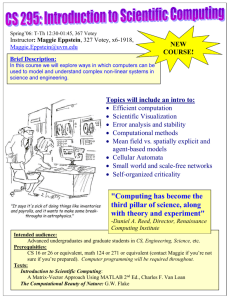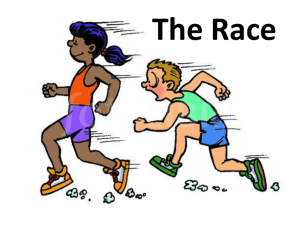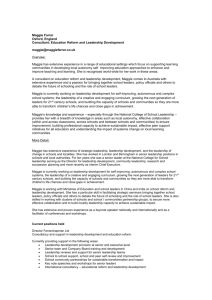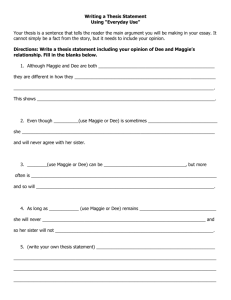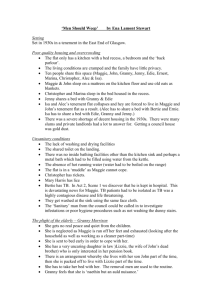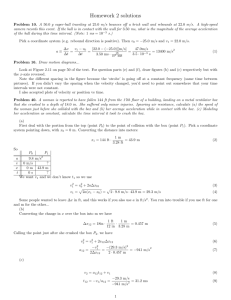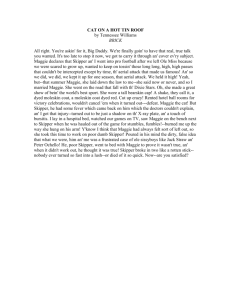Contemporary Scottish Theatre
advertisement
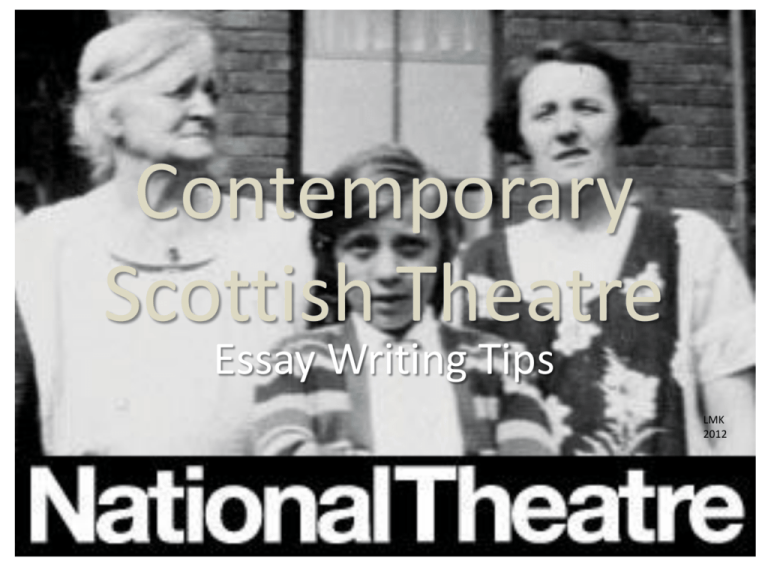
Contemporary Scottish Theatre Essay Writing Tips LMK 2012 Essay Writing Wording • The questions will be worded in different ways e.g. “Outline..” “Argue a case..”, “Discuss..”, “Comment on..”, “Account for..”, “Identify techniques..” You must make sure you know what these are asking and how to answer the different types of questions. Before you start • Read the questions in both sections (don’t bother reading the other questions in the other two sections) and then read them again! Don’t assume you can or cannot do a question – make sure you understand what they are asking for before you make the decision. • Break the chosen question down and underline key words. • Remind yourself of lessons when the issues in the question were discussed. • Make a quick plan and choose the plays/characters you will use – use each play if possible. • Check again that you have understood the question. Essay Writing Quotes • These are used for several reasons: • Express neatly an idea or comment you wish to make • May develop and idea or point of view • Support or emphasise a particular point • May describe or sum up a character or situation perfectly • Learn some useful comments for both the areas of study and remember to say who said what and to who. Introduction • Make it clear that you have understood the question at this point and define any key words. • You do not need to say which plays you will refer to – just get on with the essay. • If you are asked to be for or against a particular point of view, make your decision clear at this point. Remember that you could retain a neutral point of view. Sustain this perspective till the end but discuss both sides of the argument to inform your decision. Essay Writing Essay • • • • • Ensure all statements link directly to the question and give evidence for everything you say- plot, dialogue (QUOTE!), setting, character development, characterisation… Use essay terminology like “however”, “it can be seen that”, “it is clear that”, “such as” to help you link ideas and examples. Make sure that each point is fully developed and all angles of that point have been explored without repeating yourself. Use quotes as often and appropriately as you can. Show in-depth knowledge of the plays. Get beyond the superficial. Conclusion • If it is a debate question then round off the essay linking back to your original conclusion (for, against, neither) • Finish the essay smoothly with a simple and brief summary and restatement of your answer to the question. Social Essay Paragraph 1 • Use the words in the question and say which plays you will refer to – two full length ones at least!! • Define any words that will help you to focus your answer. • You can agree, dispute or show two sides to a question that asks for an opinion – just be sure you can back it all up! Paragraphs 2 & 3 • Choose and write about the main character in each of these plays. • Analyse their role linking back to the question – you may refer to: characterisation; relationships; interaction; status; role; purpose; motivation; impact on audience; roles of women and men in society, etc. • Use quotes to help you back up your points. Social Essay Paragraphs 4,5,6 • Choose a few of other characters from each play and discuss them in the same way. Paragraphs 7,8,9 • Identify themes in the play that help to develop your answer to the question. • This might include; class; poverty; prejudice; deprivation; (un)employment; living and working conditions; domestic violence; communities and their strengths and weaknesses; social and financial exclusion; the need for social reform (change); changing aspirations; age gaps and approaches to life. Social Issues Paragraphs 10, 11 • Identify and discuss the settings for the plays – geographical setting and social setting. Link to the question!! Paragraphs 12, 13 • The plot and structure of each play can be discussed in relation to the question. • Use accurate background information to back up your points e.g. the 1930s depression. 1950s Scotland; 1990s Scotland Social Essay Final Paragraph Sum up how your knowledge of the plays confirms your answer to the question – this will make sure you have not gone off at a tangent and is a check for you and need not be long as you will not be making new points and so are unlikely to gain any extra marks. However, it is at the discretion of the examiner to give marks for good structure and relevant use of quotes. Summing up is part of a good structure. Themes & Issues • • • • • • • • • Employment Living conditions Social pressures Workplaces Social Roles Dreams/Ambitions Fear of Authority Acceptance of Situation Importance of Community • Images of Scotland • Society’s Expectations • Attitudes towards authority • Social Exclusion • Educational Exclusion • Opportunities For Advancement • Stereotypes – boss, employees, social status Men Should Weep • Social, Political and Religious Dimensions The social background and conditions are strongly influenced by the political problems and social upheaval in the 1930s. Scotland like so much of the industrial world, was in deep economic depression . This resulted in unemployment, social deprivation and a crisis of confidence in the existing political and social structures, This also had a major influence on the status of women, the roles of men, the problems that poverty brought in terms of health, family situations, communities pulling together while being pulled apart by their social status. Men Should Weep Poverty/Social conditions/Public Health/Community/Family • Granny stays with the family despite their poor conditions and already overstretched finances. The house is a mess. Kitchen with a bed recess. No privacy. • Alec’s tenement building has collapsed • Fear of illness which grips the Morrison household • Bertie suffering from TB – Infection worsened by dampned, cold and malnutrition • Edie has cast off clothes – younger children would wear their older siblings clothes • Maggie calms the wailing baby with sugar • No real meals – “jeely piece” for the kids • Lily has bought Maggie a tin of beans to help out with food • Edie has no trousers “I’ve nae breeks” and Maggie’s solution is to visit the Mission “I’ll see whit I can get doon at the Mission – if I’ve got onything left efter settlin the grocer..” Men Should Weep • • • • • • • • • • • • Maggie mentions going to “the mission” to get clothes – they’ll be second hand charity and only if she has any money left Politicians are blamed for the lack of money “I’ve seen yous men haudin up street corners..” There is frequent mention of worms, rickets, lice, “beasts” – all symptoms of poor nutrition, health, hygiene and housing. Edie’s neck is cleaned – not the rest of her which only seems to get washed on a Saturday. Mention of more poverty – no hot water, no place to dry clothes. Lily has a job as a barmaid and is independent – doesn’t want a man. Lily brings in more food to help – black pudding/ginger bread Edie comes in from the outside loo. Maggie controls the kids by hitting and shouting at them. The children are always hungry. They can’t play inside in case they wake Bertie up Mr & Mrs Bone are arguing upstairs and this is overheard by the children. It seems as if it is normal and acceptable to them “That’s him bashin’ her again” Alec is in trouble with the police and the neighbours know about it. Men Should Weep • “The Sanitary” – The teacher said that Mrs Harris’ daughter has “beasts” (lice) in her hair. Edie repeats this to Maggie and she suggests to Mrs Harris that she gets something from the chemist. • A need for neighbour to help each other – with food, bread, looking after Granny and the children for Maggie while she takes Bertie to the hospital. • Jenny brings bashed fruit from job at the greengrocers • Maggie has to get up every night to deal with Bertie • Jenny argues with John – “some men gets on and makes money, depression or no. Ithers hasnae the brains” • Mention of Granny’s pension being used to get food for the family. • Bertie kept in hospital – pressure on Maggie • Jenny still going to leave to get away from the problems • John blames himself for Jenny leaving “A we’ve din wrong is tae be born intae poverty.” • Stress is getting to John who threatens his wife. He indicates that tidying up isn’t man’s work and then falls apart when Maggie reminds him that she is the one bringing in the money Men Should Weep • Maggie collapses weeping as the strain is too much for her. To John – “leave me alane! I hate ye! I hate the hale lot o ye’” • Maggie is devastated at the thought of Bertie being away from her, and regrets her reluctance of “getting up tae him in the night” • Sudden change at the beginning of Act. House is tidy, decorations up, wireless set and football boots now evident. Maggie has a new dress on. Granny is back and it’s Christmas Eve. John has a new job – instant confidence. John’s brought Maggie a hat. • Mentions of buying presents for the children – probably their first in years. • Concern over Bertie who is in hospital. • Isa has had enough of Alec and leaves him • Jenny mentions that Maggie won’t get Bertie home while she remains in the slum – asks Maggie to put her name down for a council house. • Jenny and Alec both talk about suicide (throwing themselves into the river – Clyde probably) • Jenny is living with a man, although they are unmarried. • They talk about the huge waiting list for a council house. Men Should Weep Social, Political and Religious Dimensions • • • • • • • Glasgow took the brunt of the depression in the 1930s and acquired many negative stereotypes. Unemployment, sub-standard housing and poor levels of health had a dramatic effect on the national character of Scotland. Men returning from the war found that women had taken on jobs due to the shortage of men and these therefore became labelled as female jobs. After the war ended there wasn’t the need for weapons, which resulted in a significant loss of jobs, and unemployment for those who had fought in the war. Religious sectarianism was rife in Glasgow. Although the country had been predominantly Protestant since the Reformation, an influx of Irish immigrants drawn to the industry on Clydeside throughout the 19th and early 20th century, had established a large Catholic community. Unemployed, skilled labourers from the Protestant community complained bitterly about Irish immigrants taking “their jobs” and this brought ruthless discrimination in the labour market. The Church of Scotland positively encouraged this anti-Catholic feeling at the time. Children generally went to either Catholic or Protestant schools, they lived in different streets and areas of the city, and the rivalry was played out on the football field between Rangers and Celtic. Men Should Weep The Elderly • Maggie (talking about Granny) “I wish you could pit yersel tae bed. Ye’re as much bother as anither wean.” • Granny “I’m jist an aul nuisance takin up room.” • Mrs Wilson “Old folks is an awfu problem” • Granny “It’s awfu tae be aul an kicked aboot frae yin hoose tae the ither.” Men Should Weep Political • Granny “Goad bless Lloyd George! Him that gie’d us wur pension.” • Maggie “I dinna ken whit they dirty rotten buggers in Parliament are daein wi ma money, but they’re daein something.” • Maggie to John after he’s been ‘looking for work all day’ “Aye I’ve seen yous men looking for work. Haudin up street corners, ca’in doon the Government – telling the world whit you’d dae if you wis rinnin the country” Men Should Weep Violence/Crime • Lily talking about Alec “Ye mind yon tempers? Mind the time he jist missed me wi the breid knife?” • “John takes Jenny by the shoulders and shakes her” – stage directions. • “John hits her across the face” – stage directions (John hits Jenny) • Trouble that Alec had got into in the past – “the Polis… and the court… and yon Probation Officer.” • Mrs Harris on seeing Mrs Bone’s black eye that she got from her husband “Hoo’s yer keeker the day? Och, it’s no as bad as the last yin ye had. Whit did ye bump intae this time?” • Lily to Alec about Isa “If I wis you, Alec, I’d wallop that impudent wife o yours till she wis black an blue.” cont. / crime • Alec about stealing the handbag “It’s no safe, Isa – ye’ve got tae get rid o the evidence – the Polis…” • Alec after Isa has been flirting with another man “I’ll kill ye! I wull! I’ll kill ye!” • Suicide – Alec “If I chucked masel intae the Clyde naebody’d care. I wisht I could! But she’s right – I hevna the guts!” • Suicide – Jenny “It kind o slinks alang slow, a river, in the night. I was meanin tae let it tak me alang wi it.” • Isa and Maggie arguing – Isa “You keep yer insultin names tae yersel, ye dirty aul bitch!” Maggie “I’ll learn ye tae ca me a bitch (she slaps Isa’s face)” • Maggie loses her composure when she sees Ernest’s scuffed toe-caps on his new boots “Whaur d’ye think I’ll find the money for anither pair? Oh, I cannae staun ony mair o this… I cannae staun it!... (shouting at John) Leave me alane!... I hate ye! I hate the hale lot o ye!” • Alec to Isa after pulling a knife and holding it to her face “Mark ye? Whit makes ye think I’d stop at spoilin yer face for ye?” Men Should Weep Social, Political and Religious Dimensions • • • • • • • • • • • • Social conditions Setting/living environment Urban Scotland Deprivation Social divisions Impact on characters/Relationships Economic decline/post war Depression Characterisation/portrayal Drinking Death – Jenny/Alec suicide background Unemployment Women looking for extra work - cleaning The Steamie Social, Political and Religious Dimensions • “Steamies” could be seen as a ‘weekly club’ where information and gossip were exchanged. This was the women’s only opportunity for this type of meeting. It was a necessary visit as there were no washing machines. The washing was transported in many ways e.g. by pram or on the backs of men and children were often paid for this service. • Larger families meant larger washings. Women did not retire at sixty and no apparent support network was available to help. Social status was often defined by employment and degree of cleanliness. Women were aware of their situation, the unfairness of it yet seemed powerless to alter it. Cultural aspirations are linked to cinematic observations – escapism. Social commentary on life in a tenement is exemplified in the song “Dreams Come True”. • All the songs deal with social and political issues involving the women and their families. The Steamie Social, Political and Religious Dimensions • • • • • • • • • • • Nationalism is not featured fully throughout the play, however there are some passing references to the ‘English’ and the British films by the characters during the play; “I cannae stand the wey they talk aw yon ya ya ya.” Doreen The play does not reflect a feeling of nationalism but is seen more as a ‘class play.’ Money is a theme throughout the play. The women bring up money frequently in their conversations during their time at the wash house, in reference to the American houses; “They cost a fortune.” Dolly Alcohol is mentioned a lot throughout the play. Most of the time, the subject of alcohol is brought up by the only male character – Andy – who is drinking on the job yet accuses the women of being the drinkers; “Do you know where they’re gettin’ the drink fae Mrs Culfeathers?” This is ironic as throughout men are described as being drunk all the time – not the women as we find out when Andy has too much to drink. “Ah’ve hid a wee drink… but that’s between you and me” Andy “He’s lying up there drunk already, oot the game, sick o’er the carpet, pig” Magrit “Aye, he likes a drink your Peter.” Dolly The Steamie Social, Political and Religious Dimensions • • • • • Imbalance of Wealth – in the play there is a clear divide between the hardship of the working class and the wealth of society. This is shown mainly through Mrs Culfeathers’ situation as she is a very old woman who is not particularly very physically strong but she is having to do a lot of hard work for her and her husband: “She said she’d been here since wan o’clock. Imagine havin’ tae take in washin’ at her age. Ye’d think her family wid help her oot.” This shows that Mrs Culfeathers was from the working class of society and was having to work at a very old age just to be able to keep herself and her husband alive. Relationship between the individual and the establishment No characters are involved in conflict with the establishment. Mrs Culfeathers is the victim in the play although all of the women could end up like her. Doreen hopes to avoid this by going to Drumchapel. The Steamie Social, Political and Religious Dimensions • • • • • • • • Stereotyping – in the play, most of the characters are stereotypes but possibly not Mrs Culfeathers. They are all working housewives ranging in age. There is a lot of talk about how much the women have to do in the house, how much hard work it is and how much the men do not do to help. We hear a lot about this from Magrit’s monologue “Isn’t it wonderful to be a wuman.” “You get up at the crack of dawn… You don’t even get a cup of tea before you tidy up. Then you’ve got to go to work…” This shows how much work the women had to do and then they were in the Steamie doing the washing with no help. Religion – Magrit is Catholic – “Ahv dropped ma fag. That’s God punishin me so it is.” Doreen “Will you have to tell that when you go to confess?” Aspirations for a better life. Threatened by new laundrettes – Mrs Culfeathers doesn’t want the change because she likes the company. Families help each other out. Friendship – women work and spend time together, they have a laugh, different ages, pass the time, release from the home environment, place they can meet. The Steamie • • • • • • • • • • Post war optimism – 1950s Welfare State – ‘state’ responsibility for the old and sick (Bevan 1947) Slum clearance – urban regeneration (the schemes) Influence of the film industry on attitudes and expectations (particularly American) Community Spirit and support Full employment in the shipbuilding industry Men expected to be in positions of authority (Andy, The Doctor) The public ‘baths’ A growing market in domestic appliances Religion – merely a curiosity for women but sectarianism rife in the world of football.
